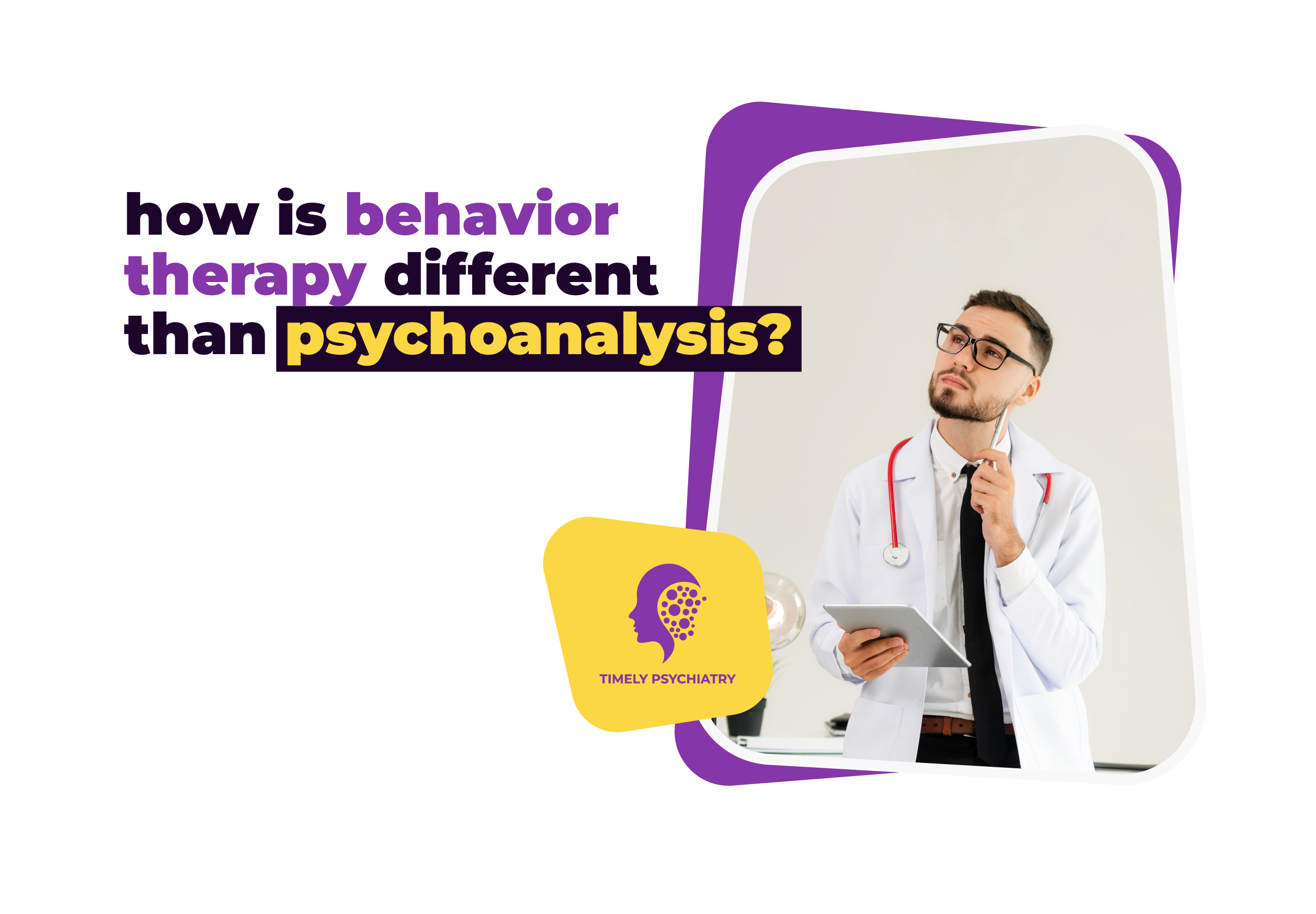The field of mental health therapy is vast and diverse and provides countless avenues to healing and self-understanding.
The two most prominent among many therapeutic approaches include psychoanalysis and behavior therapy, each with its own philosophy and methodology.
Deciding between these two schools of thought is usually deep and affects the therapeutic process differently.
For people who are involved in psychological services, it is important to be aware of these techniques in order to develop a custom treatment plan that works.
In this post, we will discuss the main differences between behavior therapy and psychoanalysis laying emphasis on their origins, techniques, and suitability for different clients’ types.
By the end of your reading you will walk away with a clear understanding of how each methodology operates and who might benefit most from their unique benefits.
What is Psychoanalysis?
Developed by Sigmund Freud in the late 19th century – psychoanalysis represents exploration into the unconscious mind to reveal past experiences and internal conflicts.
This approach believes that much human behavior originates from hidden motives or desires; therefore understanding and addressing the root causes are critical in curing mental disorders.
Concepts of Psychoanalysis
- The Unconscious: Freud’s pioneering concept of the unconscious where repressed thoughts and memories reside, forms the basis of psychoanalytic theory.
- Free Association: Clients are encouraged to verbalize thoughts without censorship which allows unconscious material to surface.
- Dream Analysis: Dream content is viewed as symbolic expressions of unconscious wishes and fears.
- Transference: The phenomenon of the client projecting feelings onto the therapist as they might do with figures from the past.
What is Behavior Therapy?
In direct contrast, behavior therapy puts less emphasis on the inner workings of the mind and more focus on observable behavior.
Coming about in the 1950s, this idea, known as behaviorism, suggests that our behaviors are learned and can be unlearned through conditioning and other interventions that are carefully structured.
Concepts in Behavior Therapy
- Learning Theory: Behavior therapy borrows heavily from the principles of operant and classical conditioning.
- Therapeutic Techniques: Methods like systematic desensitization, aversion therapy and token economies are used to change behavior.
- Collaborative Empiricism: A strong emphasis on setting concrete, measurable goals and the collaborative effort between therapist and client to achieve them.
- Focus on the Present: Unlike psychoanalysis, behavior therapy concerns itself mainly with understanding and changing current behaviors with little interest in the past.
How Is Behavior Therapy Different Than Psychoanalysis? – Main Differences
The Difference Between Philosophies
Let’s talk about how is behavior therapy different from psychoanalysis.
The differences between behavior therapy and psychoanalysis are pretty big, affecting not just how therapy is done but also the type of relationship with the therapist and the goals of the treatment.
Goals and Objectives
- Psychoanalysis: The main goal of psychoanalysis is to use free association and dream interpretation to gain deeper insight into the roots of psychological distress.
- Behavior Therapy: Behavior therapy differs from psychoanalysis in that it alters a client’s environment or reshapes their cognitive processes in order to change maladaptive behaviors, usually with the use of specific techniques.
Therapeutic Techniques
- Psychoanalysis: Usually involves the ‘talking cure,’ involving open-ended discussions, dream interpretation and the examination of resistance and defense mechanisms.
- Behavior Therapy: Focuses on precise and structured treatments, like exposure therapies to directly target and correct problematic behaviors.
The Role of the Therapist
- Psychoanalysis: The therapist is often less active, acting as a neutral interpreter who assists in self-discovery.
- Behavior Therapy: Therapists are more directive, actively guiding the client through exercises and psycho-educational components to encourage behavioral change.
Who Benefits from Each
Customizing Therapy to a Client’s Needs
Although psychoanalysis might resonate with those looking for in-depth self-exploration and resolution of longstanding issues, behavior therapy can be instrumental for people looking for practical and results-oriented change.
The choice between the two often depends on the extent of the condition, the willingness to participate fully in the therapeutic process and personal preferences for introspective versus action-based approaches.
Psychoanalysis
- Ideal Candidates: People with complicated, deep-seated emotional struggles or those looking for a greater understanding of themselves and their patterns of behavior.
- Common Conditions Addressed: Depression, personality disorders and chronic psychological issues.
Behavior Therapy
- Ideal Candidates: People looking for rapid symptom relief, practical coping strategies or people dealing with specific phobias or addictions.
- Common Conditions Addressed: Anxiety disorders, obsessive-compulsive disorder, phobias, and manage ADHD.
In Summary
To sum it up, choosing between behavior therapy and psychoanalysis depends on what you need and want.
Psychoanalysis seeks to reach your past experiences and unconscious mind so as to understand your problems.
Behavior therapy changes what you do to help you feel better quickly.
At Timely Psychiatry, we’re here to help you figure out what works best for you.
Our experts can create a treatment plan that’s just right for your recovery – book an appointment to discuss your needs.
FAQ
How long does traditional psychoanalysis typically take?
Traditional psychoanalysis can last from several months to several years.
The main goal of psychoanalysis is to?
The main goal of psychoanalysis is to bring unconscious thoughts and feelings to the conscious mind to understand and resolve them.
Four fundamental concepts of psychoanalysis are?
The four fundamental concepts of psychoanalysis are:
- The unconscious mind.
- Resistance.
- Transference.
- Repression.
Sigmund Freud introduction to psychoanalysis?
Sigmund Freud introduced psychoanalysis as a method for treating psychopathology by exploring the interactions of the unconscious and conscious minds.
Which concept is not associated with psychoanalysis?
Positive reinforcement is not associated with psychoanalysis; it’s a concept in behavior therapy.
The basic assumption of behavior therapy is that?
Behavior therapy has a fundamental premise that all behaviors are acquired through various types of conditioning methods which can subsequently be unlearned by use of different forms of conditioning techniques.
Which of the following is not true regarding behavior therapy?
It isn’t true that behavior therapy involves exploring the client’s past to uncover underlying conflicts; this is a feature of psychoanalysis.

